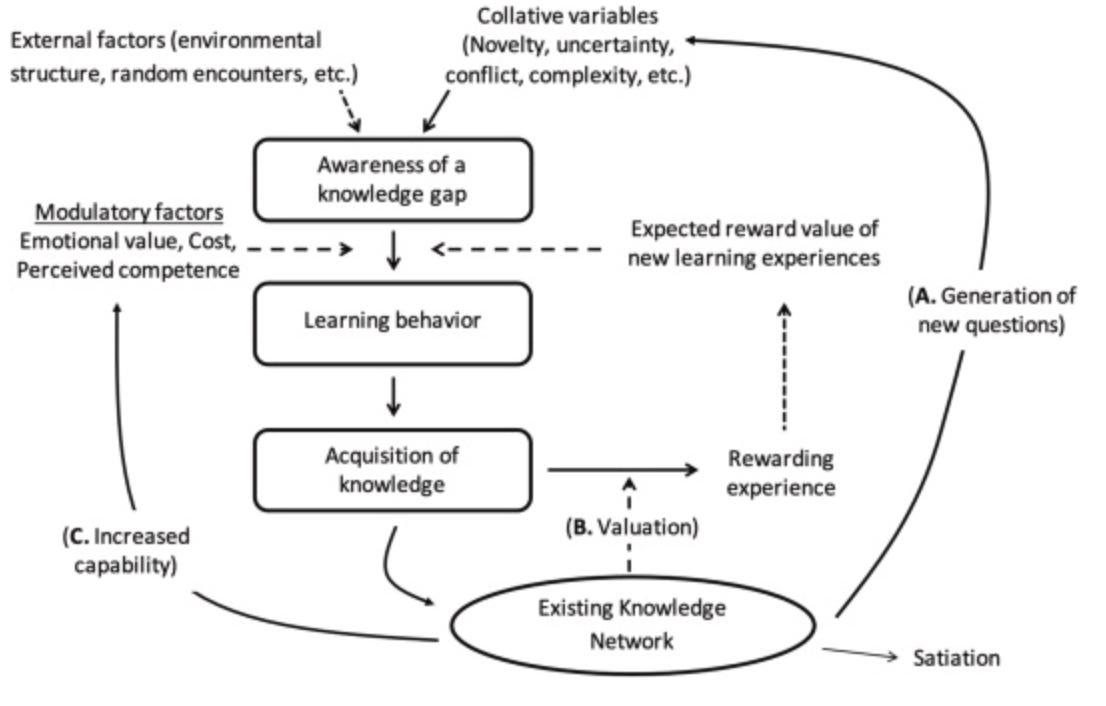The Reward-Learning Framework: How Motivation Fuels Knowledge
The science of lifelong learning.
External rewards can kick open the door to your kid’s learning — but what motivates your kid to keep learning?
When the rewards fade, when the cash prizes run out, what spurs your kid onward into excellence while their peers remain bogged down in boredom?
The Reward-Learning Framework of Knowledge Acquisition
There’s a flood of research that shows “intrinsic” vs. “extrinsic” isn’t an accurate way to look at motivation. Instead, these two systems work together. Psychologist Kou Murayama is leading this charge. His research shows that while extrinsic motivation can act as the gun going off at the starting line, intrinsic motivation is what keeps students running.
In 2022, Murayama coined the reward-learning framework of knowledge acquisition to break down this science of learning. Don’t worry — it may sound like a mouthful, but it’s not. Here’s the framework in simple terms:
1. The more you know, the less you know
We’ve all been down an Internet rabbit hole. Black holes to the Roman Empire, light waves to the chemistry of salt — the more you learn about the world, the more you realize how much you don’t know at all. This is why the smartest person you know is typically the first to say the words: “I don’t have the answer to that.”
Every time your kid acquires new knowledge, it reveals their knowledge gaps. This triggers natural learning behavior. For your kid, the world opens up, revealing itself as an infinite well of new knowledge to acquire.
2. Information Sonder
“Sonder” is a term coined by writer John Koenig in The Dictionary of Obscure Sorrows. It describes the sudden realization that every person around you has a life as vivid, complex, and real as your own — favorite colors, embarrassing memories, ambitions, routines, heartbreaks, and joys. It’s overwhelming to think about.
Apply this to knowledge, and it’s even more overwhelming. But also: exciting.
I call this “information sonder” — the realization that every subject, no matter how ordinary, hides its own infinite depth once you start learning about it.
Maybe the best example here is a picky-eater. Is your kid a picky-eater? If yes, then you know how difficult it is to convince them to try something new. But once they try something new, and like it, they realize what they’ve been missing out on: the depth, the diversity, the vastness of flavor out there in the world for them to experience. It’s motivating, is it not? Suddenly, kids want a taste of everything.
The same is true of information.
3. Competence changes everything
In psychology and education, competence simply means a child’s belief that they are capable of learning, mastering, and accomplishing tasks. And there are few things more powerful for a child than competence.
It’s not about skill, but the perception of one’s ability. When your kid feels competent, they’re more motivated to take on challenges, persist through difficulty, and seek out new opportunities to learn. This is what happened with Elle. The more she learned and accomplished, the more she realized she had the ability to learn and accomplish. Her perceived competence of herself skyrocketed.
In a nutshell, competence is the feeling of “I can.” And oftentimes, that’s motivating enough in itself. The more kids succeed, the more they believe they’re capable — and that belief becomes the engine of curiosity.
For my visual learners out there, here is Murayama’s reward-learning framework in action:
Essentially, here is what keeps your kid motivated to learn:
They become aware of something they don’t know the answer to (i.e. a knowledge gap).
This triggers learning behavior (i.e. they go find the answer!).
They gain new knowledge and feel a sense of accomplishment.
This raises new questions, which leads to new knowledge gaps, and the cycle repeats itself.
The greatest self-feeding system
At some point, learning itself becomes the reward. That’s why some kids stay up past midnight devouring books and scrolling Wikipedia. Because they love knowledge. Once you experience it, the cycle feeds on itself.
Murayama’s framework shows that extrinsic rewards open the door, competence builds momentum, information creates an itch, and knowledge itself becomes the reward that sustains lifelong learning.
Want to see how Alpha School turns kids into lifelong learners? Attend an information session or showcase to learn more.




As a principal of an established charter homeschool hybrid I’d love to bring this to my students but we can not afford the options as presented. Any ideas or thoughts to help schools make this change at a more reasonable cost? Let’s partner and show it is possible!! Classical Academics, Coastal Academy San Diego
This is what my current college subject is about: motivation and learning, and it actually inspired me to write this note: https://substack.com/@normasancho/note/c-164923458